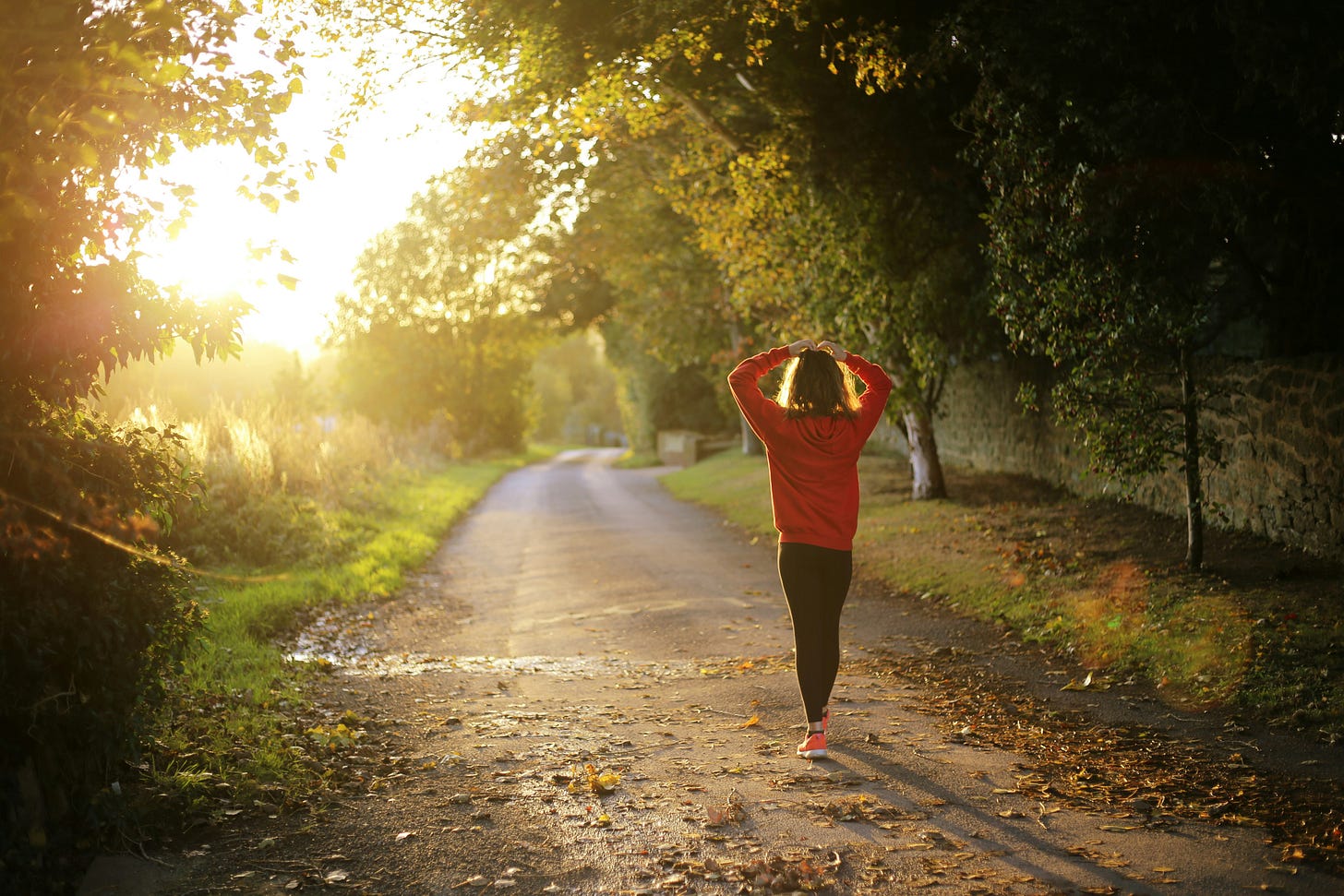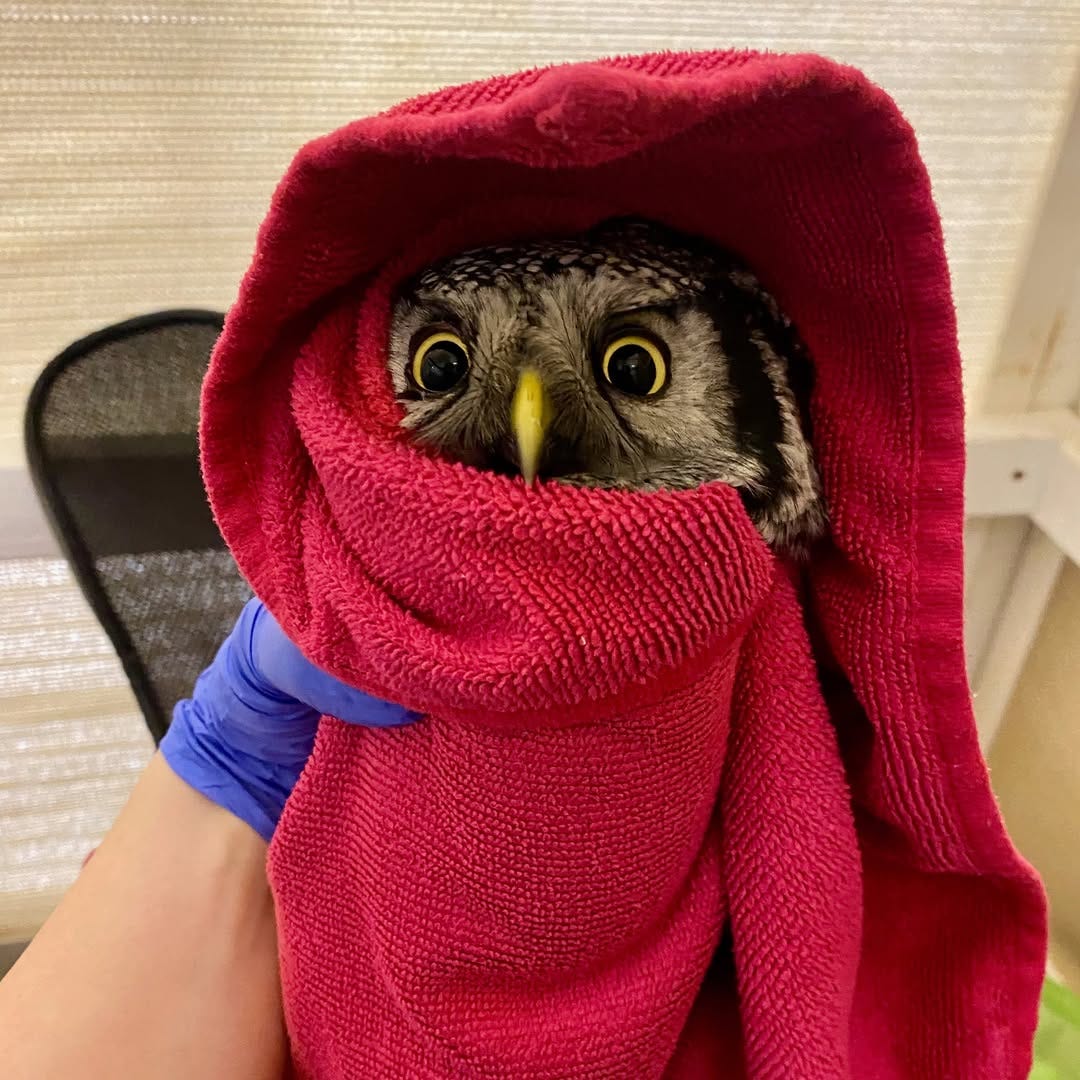Hi, and welcome to Monday #X with M. Each week, I’ll share some topics I’ve come across recently—an idea, article, or story—that caught my attention. I’ve learned so many interesting things from the people who’ve shared what they’ve found useful, and I consider that an act of kindness. This is my weekly care package to you, filled with fun and/or thoughtful discoveries, and sometimes a bit of venting about the craziness of the world to start your week on a good note.
I’ve chosen the #X format because I sometimes struggle with consistency, and I thought seeing the number grow each week would motivate me to keep going. Let’s get into it!
Spotlight Three
I. Trick Yourself Into Walking

If you are anything like me, you’ll have challenges making physical activity a fixed part of your life. Unlike going to the gym or incorporating working out into your schedule, going for a walk could be the most doable option, especially when the weather is getting better. But to overcome the resistance, there are tricks you could use to make this a more enticing experience:
Rob Walker, author of “The Art of Noticing,” said that when he walks, he likes to impose a mission or build a framework around it to add a little novelty and engagement to an activity that is “literally pedestrian.”
“Otherwise, you can easily end up on your phone, or in your head where all you do is ruminate over the deadline that you’re missing or the smartass remark that someone made to you,” he said. “And there could be dragons walking around and you wouldn’t notice them.”
According to this article, you don’t need to do 10,000 steps a day; even 4,000 daily steps have been shown to have benefits.
Now here are the tricks:
Sound Stroll: Get outside and tune into the sounds around you. It could be anything from bird calls, to songs coming out of the cars, to anything that could be specific to your neighbourhood.
Calendar Challenge: try taking pictures around your neighbourhood as if you were shooting a dozen photos for a wall calendar. You can find a theme, anything that’s weird, or a specific subject matter, to build this up. I remember there was a time when Tom Hanks used to put pictures of a single glove, abandoned on the floor, on his Instagram.
Counting Walk: Pick something that’s plentiful in your area and count it as you walk along. Counting something besides steps is an easy way to be mindful of your surroundings “but it does take some concentration,” Walker said.
Color Circuit: Set out with the goal of focusing on one colour during your stroll. If you decide on the colour blue, for instance, pay attention to all the blue things that you see. This is quite interesting; I learned about this in a writing assignment once, where we were supposed to notice these things and write about them. You can make up a story that connects these items and make a fun exercise out of it.
II. Be Kind to Yourself

Don’t be your worst critic. As someone struggling with a lack of self-compassion, I have tried many things to overcome this mean, unforgiving voice in my head who is an expert in pointing out all my shortcomings and then some. The best advice I have heard about this seems easy enough but not simple to do: Talk to yourself the way you would talk to your best friends when they make a mistake.
What is self-compassion?
“Self-compassion is the process of expressing support, warmth and understanding toward yourself during difficult times — and recognizing that you aren’t alone in your imperfections.”
What are the myths about self-compassion?
One common myth is that self-compassion will undermine motivation to improve yourself or your circumstances. Wrong! There is nothing demotivating about being kind to yourself. It will give you enough energy to pick yourself up and keep going.
Self-compassion is self-indulgent. Oh, please! If you ever got a chance to live inside the head of someone like me, you would know self-indulgence has no place there. Self-compassion is about taking better care of ourselves and reducing burnout.
How do you develop self-compassion?
Say kind things to yourself every day: If you’re prone to beating yourself up, she added, then try speaking to yourself kindly, just like you would to a good friend in the same situation.
Take a compassion break: Put a hand over your heart or use another soothing touch that feels caring. Send a kind message inward: “It’s OK to feel this.” or “You’re doing the best that you can.” These tiny gestures can make a big difference.
Pay it forward: Self-compassion might involve establishing healthy boundaries in a relationship or even turning your compassion outward — for example, volunteering for an important cause or attending a protest to try to bring about positive political or social change.
III. Rushdie on AI Amongst Other Things
Salman Rushdie was making his most high-profile in-person appearance in the UK, Speaking at the Hay festival in Hay-on-Wye, Wales since a stabbing in the US while he was on stage left him blind in the right eye. The audience was asked to arrive in good time because of the extra security. Police officers stood by in the wings and security staff flanked the stage.
He was asked about a number of issues, from his attack to Donald Trump.
On his attack, he said he’s glad that trial is over and done with, and that he got the maximum sentence of 25 years. He continued: “Ever since the attack, really, the only thing anybody’s wanted to talk to me about is the attack. And I’m over it. It will be nice to have stories to talk about.
“When I wanted to be a writer, it never occurred to me that I would write about myself. That seemed like the most uninteresting thing of all. I wanted to make stuff up.”
But he said what had given him closure was writing about it in his book Knife: Meditations After An Attempted Murder.
He was also asked about AI and had an interesting take on it. Rushdie said he had “never tried AI” and liked to pretend it didn’t exist.
But the problem AI had was that it couldn’t make up its own jokes, the writer said. “It has no sense of humour – you don’t want to hear a joke told by ChatGPT. If there’s a moment when there’s a funny book written by ChatGPT I think we’re screwed.”
Rushdie also spoke about Donald Trump, saying the world was in an “orange moment”. He said: “I don’t know what to do with it – he was elected”, but added: “So was Hitler, by the way.”
Rushdie argued that in a world where people struggled to agree on the truth, stories and fables were even more important – and could feel more real.
On a Brief Note
Owls in Towels
I stumbled upon this website by accident and found it fascinating. Their FAQ can explain what’s happening in the best way. Take a look their gallery; it’s awesome!
Q: WHY?
A: Why not!
Q: NO, BUT REALLY, WHY?
A: Owls are amazing! They are truly extraordinary creatures that serve a critical niche in our ecosystems. It’s only natural we want to help the ones that are sick, orphaned, or injured, and celebrate the wildlife rehabbers who do this work.
But watch out! Bird-handling is dangerous. Owls have sharp beaks and claws, and they WILL put up a fight. Experts protect themselves (and the owls) by wrapping owls in towels. This keeps the owl motionless, and allows the handler to complete tasks like weighing them and giving them food, fluids, medication, and xrays.
We like to see owls in towels, because it means people are helping owls. This site exists to document and share stories of owls in towels to as many eyes as possible. If nothing else, to add momentary cheer simply by showing owls receiving treatment. No ads. No sponsors. Just owls being rescued, treated and rehabilitated by people who care.
Words Worth Sharing
Always aspire to act in a way that cancels out someone else's cruel or stupid behaviour.
Carl Hiaasen
This is it for this week’s edition of Monday #X with M. If something here made you think, smile, or sparked your curiosity, consider sharing it with someone who might enjoy it too. You never know whose day you might brighten with a thoughtful word or idea—it’s a small act of kindness that can go a long way. See you next Monday!






